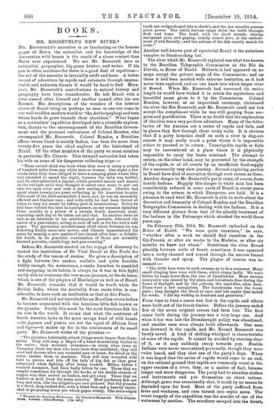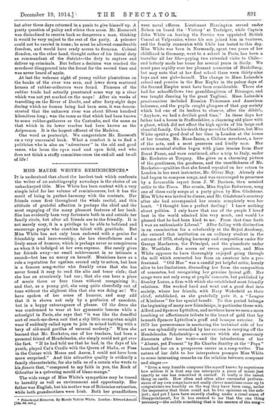BOOKS.
MR. ROOSEVELT'S NEW RIVER.*
Ma. ROOSEVELT'S narrative is as fascinating as the famous pages of Bates, the naturalist, and his knowledge of the Amazonian wild beasts is the result of a closer contact than
Bates ever experienced. We see Mr. Roosevelt here as naturalist, geographer, big-game hunter, and writer. If his pen is often careless—for there is a good deal of repetition— the art of the narrator is invariably swift and keen. A better record of adventure by rapids and cataracts through impene- trable and unknown forests it would be hard to find. More- over, Mr. Roosevelt's contributions to natural history and geography have been considerable. He left Brazil with a river• named after himself and another named after his son Kermit. His descriptions of the wonders of the interior rivers of Brazil bring us perhaps as near as one can come in our well-trodden modern world to "the Anthropophagi and men whose beads do grow beneath their shoulders." What began as a naturalists' expedition developed into a scientific explora- tion, thanks to the encouragement of the Brazilian Govern- ment and the personal enthusiasm of Colonel Rondon, who accompanied Mr. Roosevelt. Colonel Rondon, a Brazilian officer whose blood is mainly Indian, has been for more than twenty-five years the chief explorer of the hinterland of
Brazil. Of the other members of the party we most mention in particular Mr. Cherrie. This intrepid naturalist bad taken his wife on some of his dangerous collecting trips :— "Their second child was born when they were in camp a couple
of hundred miles from any white man or woman. One night a few weeks later they were obliged to leave a camping-place where they had intended to spend the night, because the baby was fretful, and its cries attracted a jaguar, which prowled nearer and nearer in the twilight until they thought it safest once more to put out into the open river and seek a new resting-place. Cherrie had spent about twenty-two years collecting in the American tropics. Like most of the field-naturalists I have met, he was an unusually efficient and fearless man ; and willy-nilly he had been forced at times to vary his career by taking part in insurrections. Twice he had been behind the bars in consequence, on one occasion spending three months in a prison of a certain South American state, expecting each day -to be taken out and shot. In another state he bad, as an interlude to his ornithological pursuits, followed the career of a gun-runner, acting as such off and on for two and a half years. The particular revolutionary chief whose fortunes he was following finally came into power, and Cherrie immortalized his name by naming a new species of ant-thrush after him—a delight- ful touch, in its practical combination of those not normally kindred pursuits, ornithology and gun-running."
Before Mr. Roosevelt started on his voyage of discovery he visited the institution of Dr. Vital Brazil at Silo Paulo for the study of the venom of snakes. He gives a description of a fight between two snakes, realistic and quite horrible. Oddly enough, the mussurama, a snake harmless to mankind and easygoing in its habits, is always (as it was in this fight) easily able to overcome the venomous jarar•aca, or fer-de-lance, which is one of the plagues of Martinique as well as of Brazil. Mr. Roosevelt remarks that it would be worth while for British India, where the mortality from snake-bites is con- siderable, to have such an institution as that at Sao Paulo.
Mr. Roosevelt bad not travelled far on Brazilian rivers before be became acquainted with the ferocious little fish known as the piranha. Surely this must be the most ferocious fish for its size in the world. It seems that what the continent of South America Jacks in the more savage kind of wild beasts —its jaguars and pumas ar•e not the equal of African lions and tigers—it makes up for in the noxiousness of its small rests. Mr. Roosevelt writes of the piranhas
r- " The piranhas habitually attack things much larger than them- selves. They will snap a finger off a band incautiously trailed in the water ; they mutilate swimmers—in every river town in Paraguay there are men who have been thus mutilated ; they will rend and devour alive any wounded man or beast; for blood in the water excites them to madness. They will tear wounded wild fowl to pieces, and bite off the tails of big fish as they grow exhausted when fighting after being booked. Miller, before I reached Asuncion, had been badly bitten by one. Those that we caught sometimes bit through the hooks, or the double strands of copper wire that served as leaders, and got away. Those that we hauled on deck lived for many minutes. Most predatory fish are long and slim, like the alligator-gar and pickerel. But the piranha is a short, deep-bodied fish, with a blunt face and a heavily under- shot or projecting lower jaw which gapes widely. The razor-edged • Through the Bra:ilian Wildeitess. By Theodore Roosevelt With Illustra- tions. London John Murray. [lbs. net.]
teeth are wedge-shaped like a shark's, and the jaw muscles possess great power. The rabid, furious snaps drive the teeth through flesh and bone. The head, with its short muzzle, staring malignant eyes, and gaping, cruelly armed jaws, is the embodi- ment of evil ferocity ; and the actions of the fish exactly match its looks."
Another well-known pest of equatorial Brazil is the notorious vampire or blood-sucking bat.
The river which Mr. Roosevelt explored was what was known to the Brazilian U.'elegraphic Commission as the Rio da Drivida, or River of Doubt. Hitherto it had appeared on no maps except the private maps of the Commission ; and on these it bad been marked with extreme hesitation, as it had never been explored, and no one knew into which larger river it flowed. When Mr. Roosevelt had traversed its entire length he would have wished it to retain the mysterious and beautiful name given to it by the Commission. Colonel Rondon, however, at an improvised ceremony, christened the river the Rio Roosevelt, and Mr. Roosevelt could not but accept the compliment while he was still gasping from sur- prise and gratification. There is no doubt that the exploration of the river was a very perilous adventure. Many of the tribu- taries of the Amazon are a series of rapids and falls, and in places they flow through sheer rocky walls. It is obvious that if a party launches itself on such a river in dug-out canoes it may easily reach a point where it is impossible either to proceed or to return. Unnavigable rapids or falls may be encountered at a place where it is physically impossible to carry the boats overland. The attempt to return, on the other hand, may be prevented by the strength of the rapids, or at all events by an insufficient food-supply for a necessarily very slow journey. Several exploring parties in Brazil have died of starvation through such causes as these. Another danger to Mr. Roosevelt's party came, of course, from
hostile Indians. Happily this danger to white men has been considerably reduced in some parts of Brazil in recent years owing to the esteem in which Europeans are held. It is a pleasure to read what Mr. Roosevelt is able to write about the discretion and humanity of Colonel Rondon and the Brazilian Telegraphic Commission in dealing with the Indians. It is a very different picture from that of the ghastly treatment of the Indians in the Putumayo which shocked the world three years ago.
On February 27th, 1914, Mr. Roosevelt embarked on the River of Doubt. "We were quite uncertain," he says,. " whether after a week we should find ourselves in the Gy-Parana, or after six weeks in the Madeira, or after six months we knew not where." Sometimes the river flowed placidly between walls of forest, sometimes it was squeezed into a rocky channel and reared through the narrow funnel with thunder and spray. The plague of insects was in- cessant
The little bees were in such swarms as to be a nuisance. Many small stinging bees were with them, which stung badly. We were bitten by huge horse-flies, the siza of bumblebees. More serious annoyance was caused by the pium and boroshuda flies during the hours of daylight, and by the polvora, the sand-flies, after dark.. There were a few mosquitoes. The boroshudas were the worst pests ; they brought the blood at once, and left marks that lasted for weeks. I did my writing in head-net and gauntlets."
From time to time a canoe was lost in the rapids, and others were built out of the forest timber. Before the journey ended five of the seven original canoes had been lost. The first canoe built during the journey was a very large one. And when it too was lost the Dreadnought policy was abandoned,. and smaller ones were always built afterwards. One man was drowned in the rapids, and Mr. Kermit Roosevelt was barely saved. A kind of shifting whirlpool is characteristic of some of the rapids. It cannot be avoided by steering clear of it, as it may suddenly sweep towards you. Hostile Indians were never encountered personally, though they were twice heard, and they shot one of the party's dogs. When it was hoped that the series of rapids would come to an end,. on the rational ground that rapids are commonly worst in the upper reaches of a river, they, as a matter of fact, became longer and more dangerous. The party had to abandon clothes and instruments and put themselves on short rationss. Although game was occasionally shot, it could by no means he depended upon for food. Most of the party suffered from fever and weakness, and cuts turned into septic sores. The worst tragedy of the expedition was the murder of one of the- watermen by another. The murderer escaped into the fortify
but after three days returned in a panic to give himself up. A pretty question of policy and ethics then arose. Mr. Roosevelt was disinclined to receive back so dangerous a man, thinking it would be very unjust to the rest of the party. A prisoner could not be carried in irons ; he must be allowed considerable freedom, and would have ready access to firearms. Colonel Rondon, on the other hand, thought rather of his literal duty as commandant of the district—the duty to capture and deliver up criminals. But before a decision was reached the murderer disappeared into the forest for the second time and was never heard of again.
At last the welcome sight of young rubber plantations on the banks of the river was seen, and lower down scattered houses of rubber-collectors were found. Pioneers of the rubber trade had actually penetrated some way up a river which was not yet marked on the maps ! After six weeks of travelling on the River of Doubt, and after forty-eight days during which no human being had been seen, it was demon- strated that the unknown river was about fifteen hundred kilometres long ; was the same as that -which had been known to some rubber-gatherers as the Castanho, and the same as that which in its lower reaches had been known as the Aripuanan. It is the largest affluent of the Madeira.
One word as postscript. We congratulate Mr. Roosevelt on a very successful book. What a comfort it is to find a politician who is also an "adventurer" in the old and good sense, who loves the open road and open field, and who does not think a stuffy committee-room the end-all and be-all of life !







































 Previous page
Previous page